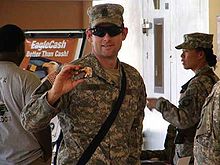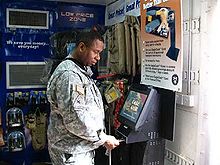
Eagle Cash
Encyclopedia

Credit card
A credit card is a small plastic card issued to users as a system of payment. It allows its holder to buy goods and services based on the holder's promise to pay for these goods and services...
or debit card
Debit card
A debit card is a plastic card that provides the cardholder electronic access to his or her bank account/s at a financial institution...
, which has an embedded microchip
Integrated circuit
An integrated circuit or monolithic integrated circuit is an electronic circuit manufactured by the patterned diffusion of trace elements into the surface of a thin substrate of semiconductor material...
which keeps track of the amount of money stored on the card and interfaces with encrypted card acceptance devices. This allows soldier
Soldier
A soldier is a member of the land component of national armed forces; whereas a soldier hired for service in a foreign army would be termed a mercenary...
s with the card to purchase goods and services at US military posts and canteens, without carrying cash, or manage their personal bank account
Bank account
A Bank account is a financial account recording the financial transactions between the customer and the bank and the resulting financial position of the customer with the bank .-Account types:...
s while on deployment or in training. The program reduces the amount of US currency
Currency
In economics, currency refers to a generally accepted medium of exchange. These are usually the coins and banknotes of a particular government, which comprise the physical aspects of a nation's money supply...
required overseas, reduces theft, saves thousands of man-hours in labor, helps reduce the risk of transporting cash in battlefield environments, and increases security and convenience for service members. It helped reduce or eliminate the need for cash and money order
Money order
A money order is a payment order for a pre-specified amount of money. Because it is required that the funds be prepaid for the amount shown on it, it is a more trusted method of payment than a cheque.-History of money orders:...
s.
Overview and history
Originally developed in 1997, the EZpay system was born as a pilot project aimed at inductees going into basic trainingBasic Training
Basic Training may refer to:* Basic Training, a 1971 American documentary directed by Frederick Wiseman* Basic Training , an American sex comedy* Recruit training...
, to alleviate some of the stress and cost of managing money while away from home. Many US military bases are structured like small towns, where goods and services are available for sale. However, transferring wages into cash, in order to purchase desired products has traditionally been a struggle. The system works through soldiers receiving an advance
Advance payment
An advance payment, or simply an advance, is the part of a contractually due sum that is paid in advance for goods or services, while the balance included in the invoice will only follow the delivery. It is called a prepaid expense in accrual accounting.-See also:*Advance against royalties*Pay or...
on their wages in the form of the EZPay card, which they can then use to purchase goods and services, such as haircuts, snacks, and recreational activities at on-base shop
Retailing
Retail consists of the sale of physical goods or merchandise from a fixed location, such as a department store, boutique or kiosk, or by mail, in small or individual lots for direct consumption by the purchaser. Retailing may include subordinated services, such as delivery. Purchasers may be...
s and stores. At the end of basic training, the balance
Balance (accounting)
In banking and accountancy, the outstanding balance is the amount of money owed, , that remains in a deposit account at a given date, after all past remittances, payments and withdrawal have been accounted for. It can be positive or negative ....
on the card would be reconverted into cash, and paid back to the soldiers. The project was a great success, since it eliminated the need for bases to keep money on hand, and saved soldiers approximately $125,000 a year in banking fees.

386th Air Expeditionary Wing
The 386th Air Expeditionary Wing is a provisional United States Air Force unit assigned to United States Air Forces Central. As a provisional unit, it may be activated or inactivated at any time. It is currently stationed at Ali Al Salem Air Base, Kuwait in Southwest Asia...
financial manager, Catherine Miles explained in a 2007 article, "It's like a gift card. [...] You can put as little or as much money as you want on it and it comes from your checking account." Unlike regular debit cards, the Eagle Cash is managed on-base, using batch processing
Batch processing
Batch processing is execution of a series of programs on a computer without manual intervention.Batch jobs are set up so they can be run to completion without manual intervention, so all input data is preselected through scripts or command-line parameters...
which ensures that the cards remained useful even when connections to banks and credit union
Credit union
A credit union is a cooperative financial institution that is owned and controlled by its members and operated for the purpose of promoting thrift, providing credit at competitive rates, and providing other financial services to its members...
s State-side are severed. The system was given widespread acceptance in 1999, just before the War in Iraq; it has since been expanded to many military bases such as Camp Anaconda on the front lines.
Benefits and savings
For soldiers, the benefits are straightforward, but for the officers in charge of the system the benefits are much more extensive. Transporting US currency overseas costs the military hundreds of thousands of dollars annually — during the Iraq War, for every $1,000,000 sent to pay soldiers in Iraq, it cost $60,000 in security, logisticsLogistics
Logistics is the management of the flow of goods between the point of origin and the point of destination in order to meet the requirements of customers or corporations. Logistics involves the integration of information, transportation, inventory, warehousing, material handling, and packaging, and...
, and support fees. It also eliminates the need for the World War II
World War II
World War II, or the Second World War , was a global conflict lasting from 1939 to 1945, involving most of the world's nations—including all of the great powers—eventually forming two opposing military alliances: the Allies and the Axis...
practice of producing the Military Payment Certificate
Military Payment Certificate
Military Payment Certificates, or MPC, was a form of currency used to pay U.S. military personnel in certain foreign countries. It was used in one area or another from a few months after the end of World War II until a few months after the end of U.S. participation in the Vietnam War -- from 1946...
. The use of a cashless economy at military stores reduces transaction times, freeing personnel from tasks like stamping money orders or counting coins — during 9 months of the Iraq War, this saved approximately 5000 hours of processing time for financial personnel. It also prevents counterfeiting.
Since the initial adoption of the EagleCash system, it has been augmented by ATM-like
Automated teller machine
An automated teller machine or automatic teller machine, also known as a Cashpoint , cash machine or sometimes a hole in the wall in British English, is a computerised telecommunications device that provides the clients of a financial institution with access to financial transactions in a public...
kiosks which allow soldiers to add funds to the card without visiting the base's finance office. Originally, this requirement caused long lines to refill cards, reducing the utility of the system. The conversion to the kiosk system, developed by NCR Corporation
NCR Corporation
NCR Corporation is an American technology company specializing in kiosk products for the retail, financial, travel, healthcare, food service, entertainment, gaming and public sector industries. Its main products are self-service kiosks, point-of-sale terminals, automated teller machines, check...
, remedied these problems and increased the ability of the system to provide easy cash for soldiers away from home — "something we often take for granted, but for soldiers deployed on foreign land, it has always been a challenge". To date, 3.2 million EagleCash and EZpay cards have been issued and used to process 16.5 million electronic transactions valued at over $3.6 billion."
External links
- Common questions about Eagle Cash — United States Department of the TreasuryUnited States Department of the TreasuryThe Department of the Treasury is an executive department and the treasury of the United States federal government. It was established by an Act of Congress in 1789 to manage government revenue...
- Eagle Cash enrollment form (pdf)

